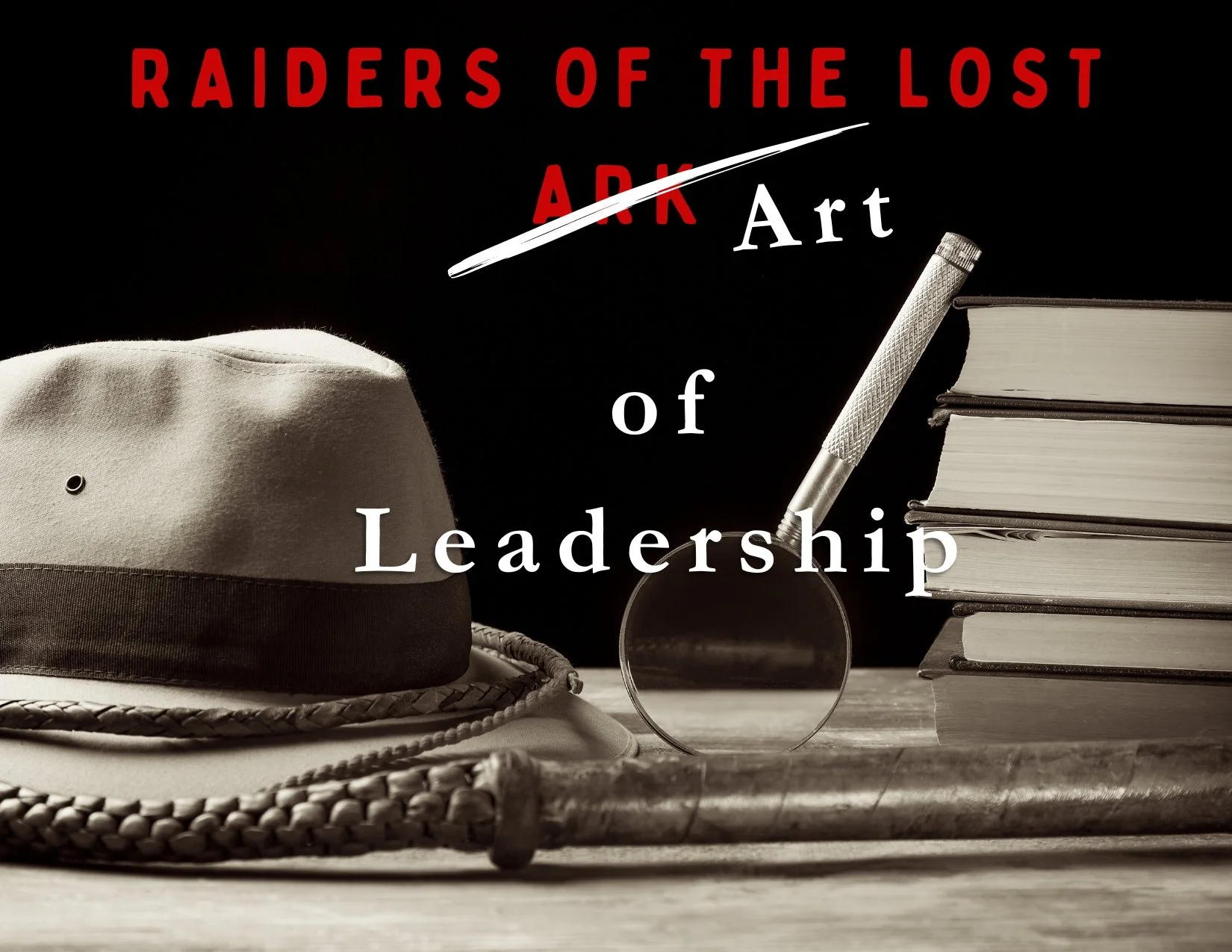Raiders …
(about a 6-minute read)Welcome back to Spiegelbild!
July was the month of storytelling and as such a reminder of the power a well told story can have. What better way to close off this month’s topic by telling you a personal story: the story of the “Why” for Spiegelbild. So, today’s blog will look a little different. ;o) Remember when Indy had the confidence to crawl through all those snakes? Let’s embark on a quest to find confident leadership.
As an early explorer of professional expectations, and while seeking to prove myself, I had the pleasure of working under a few great leaders — the kind that encouraged me to step outside my comfort zone, keep exploring, and who always had my back in case something went wrong. Leaders who were great because they had confidence in themselves and in me.
I was enabled to put my skills to good use, and encouraged to question the way things were done. Those leaders saw that as a contribution to progress and as moving us closer to achieving a project’s goal or desired outcome. My professional advice was taken seriously, and the arguments I would raise were listened to. Most inspiring and motivating for me was that I truly had permission space and was empowered to make decisions.
There were a few scary encounters when I felt the weight of responsibility on my shoulders, or feared that I could screw things up. But I gained confidence, valuable experience and grew with every challenge — and I felt very fulfilled in my professional life.
What I didn’t realize was that for every hero of leadership there are a multitude of villains that undermine the values of leadership and seek to be a leader only for their own gain rather than the common good.
The Trap of Excess Ego
The first encounter was with the trap of the oversized ego. I had been assigned to lead a project and had only been given loosely set expectations for the outcome. My leader was very hands-off during the entire project, all the way until it was time to present the results to the executive leadership team.
That is when my leader swooped in. While they had shown no interest in the project whatsoever, they now were of the opinion that “presenting in front of the executive team is the natural right of the leader”. I was asked to hand over the “treasure map”, i.e. a detailed description of the project and the results that had been achieved, as well as to prepare the presentation. The leader took everything and presented it as their own accomplishment to the executive team. All I was allowed to do was sit at the side lines and watch everything unfold. My contribution to the project wasn’t even mentioned.
A confident leader is able to leave their ego at the door. Your team is not there to pamper your ego. As a leader you should be in the service of your team; their success is your success.
The Shrine of Trust and Active Listening Skills
The next crack, or should I say rift, that illuminated the failure in the leadership ranks to me came during a strategic project that involved facilitating a group of politicians. I had been named co-lead of this project because of my past experience — or at least that’s what I thought.
One day a team meeting escalated. My boss used the occasion to hold a lengthy monologue about their own opinions. Communication broke down as there was no opportunity for a true two-way conversation. Trust in other’s abilities and capabilities was buried in a flood of words; and active listening — to truly understand what others were saying — was nowhere to be found. As the team lead my boss couldn’t manage the rising tensions, and they had no skills to find a constructive way to deal with disagreement.
In the end I was accused of "thinking too much”. The meeting ended in a stalemate, with no direction from my leader. Such direction would never come.
Ultimately, I followed the path I had initially thought out. The project was not only successful; it also received praise from the politicians as one of the best engagements they had had in a while.
As a confident leader your responsibility is to build others up, to encourage, to motivate and to inspire. Sometimes, this demands that you listen to things that may make you feel uncomfortable or make you realize that you are learning something.
But confident leaders know to ask themselves: if they don’t have the ability to listen, how will they learn what they don’t know yet? And if they don’t trust the ability and capability of people in their team to do a job well, why did they hire them in the first place?
The Shadows of Leaning In and Letting Go
Micro-managing paired with a command-and-control style of leadership is probably my “perfect storm” in the desert of the lost art of leadership. I experienced this when I was the leader of a highly complex, high-profile project that, when completed, was set to change the decision-making structure of an entire organization. However, I soon realized that I had only been given the title of “project leader”. In reality, I wasn’t leading anything.
As I said earlier, confident leaders are able to have challenging conversations. Where does the challenging conversation end and when does “micromanaging” take over?
Every step of the project was micromanaged from the “C-Suite”. Every decision was questioned. The challenge that became increasingly obvious was the lack of my leader’s ability to recognize when they were uncertain, or didn’t have all the answers themselves. Instead of leaning on me and my team to help them see the path and gain that certainty, they would insist on doing things their way. They failed to acknowledge that their own experience was limited to a certain cultural context and corporate background.
Confident leaders are comfortable with not being the smartest person in the room. They hire people into positions to help them and leverage their skills to supplement their own.
The Tomb of Empathy
My absolute low point on the downward spiral of leadership experiences was when I was told that I was being “too people focussed”. It was not meant as a compliment.
I had been the leader of a small team and we had just completed a very demanding project, with a high political profile. A team can make or break a project. Well, this team had exceeded expectations, had worked hard over the course of a year, and given their “everything” for the project.
People are the greatest asset of any endeavour. No matter how lofty your goals and how aspirational your targets: you won’t reach them without the people. I felt it was critically important to recognize the team’s contribution. It wasn’t about handing out significant amounts of money — small gestures of recognition would have gone a long way. However, all my suggested actions and gestures of appreciation were denied, with the remark that I was being too people focussed.
Confident leaders know that it’s not enough to just say people are important, they must demonstrate it. After all, if a leader is not people focussed, what are they then?
Spiegelbild’s Rescue Mission
In my experience, the lack of confident leadership and appropriate skills were widely abundant. They were hurting both people and the very concept of leadership. I decided that I wanted to do something that would lead to positive change.
Strong leadership starts with knowing yourself.
I founded Spiegelbild to offer leadership coaching that emphasizes the importance of self-reflection and puts empathy, kindness and care at the forefront. These skills — amongst others, like problem solving, adaptability, patience or resilience — are considered highly important for leadership but can remain elusive. It may sound crazy, but I decided to involve horses as “co-coaches” in Spiegelbild’s programs to make these skills accessible.
Why? Horses do not lie. Horses give honest, in-the-moment feedback of a person’s ability to communicate, relate to, and provide direction to others. Horses instinctively respond to a person’s non-verbal signals and intentions. They surface subconscious behaviours and reveal to our coaching clients subtle aspects of themselves that they may not be aware of, but that influence how they are perceived by others.
Through working with horses, leadership skills are lived as opposed to being lectured. The horses provide a safe, caring environment for our clients to reflect and explore themselves and in so doing recognize who they are, what their strengths are and what they are not. This self-recognition is the essential first step towards any change.
My hope is to support the next generation of leaders by developing leadership skills and competences that put people first. I want to help leaders to set an example — that taking care of the people we are working with and oneself is the only way going forward. Together, we can be the change.
“Now”, you are asking, “how can Spiegelbild help me become the hero of my own story towards great leadership?” If you are tired of the old command-and-control style of leadership; if you want to become an empathetic leader; if you want to grow your leadership skills but want to get out of the boardroom: we are here for you.
Go ahead and book a free discovery call by using this link [https://spiegelbild.as.me/discovery-call-zoom] to book a free 30-minute discovery call. I’m looking forward to meeting you, and discussing how equine-assisted coaching can help you to build and grow your leadership skills.
I hope you enjoyed this blog. If you did, please sign up with your email though our website to never miss a blog and to access more interesting insights and perspectives.

